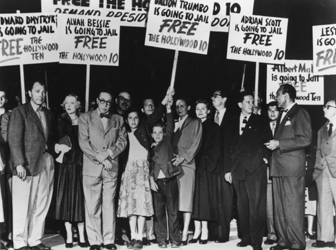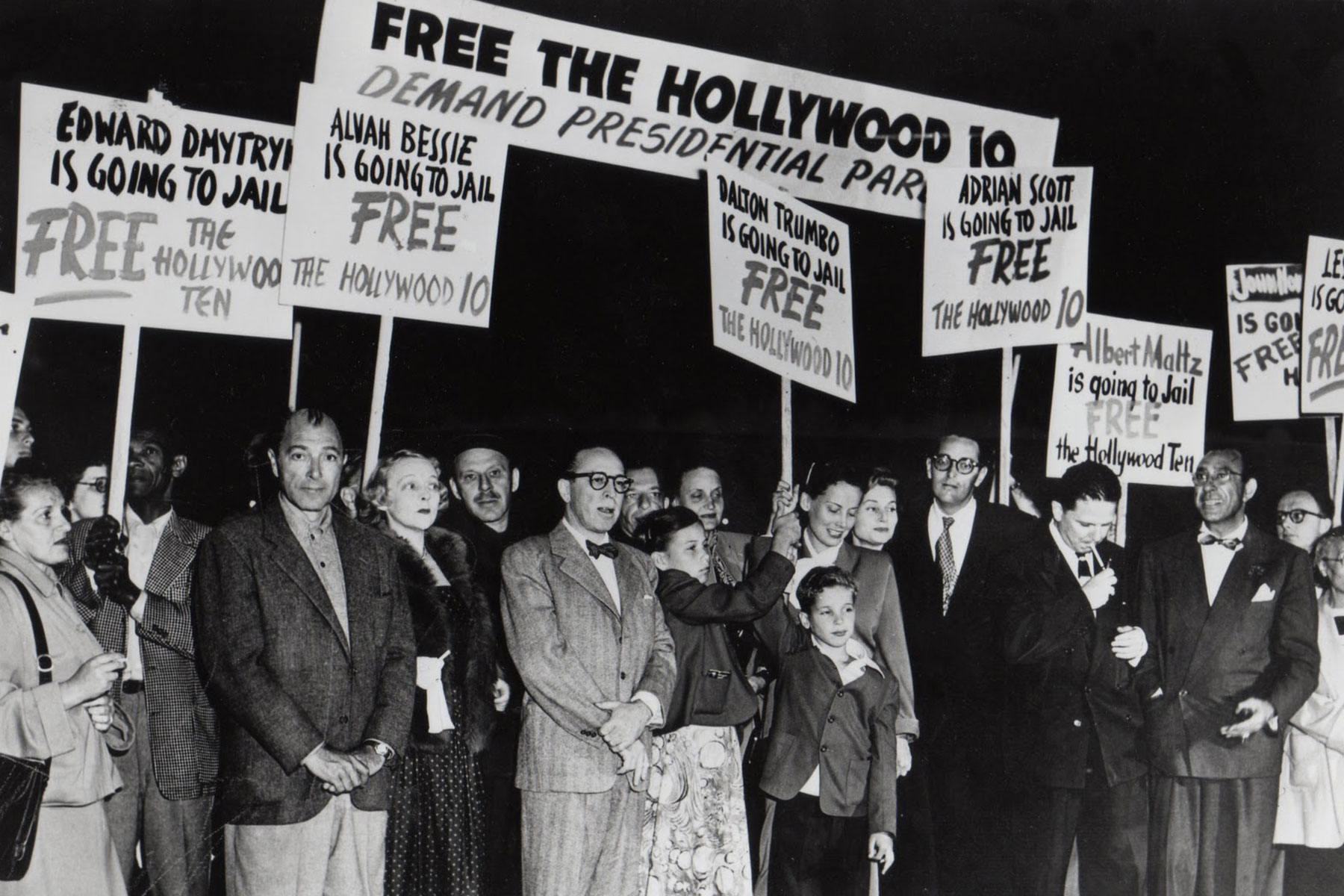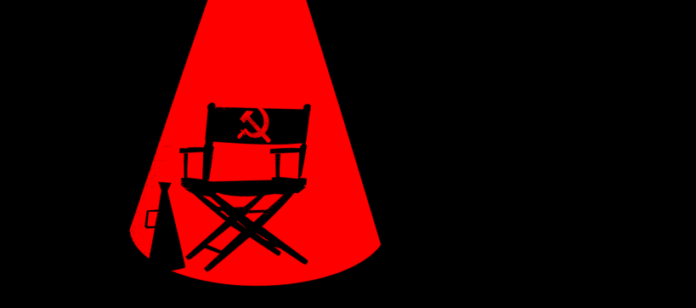The Hollywood Red Scare was a period of intense fear of communism in the U.S. Entertainment industry. It led to blacklisting and careers being destroyed.
During the late 1940s and 1950s, the Hollywood Red Scare gripped the entertainment industry with paranoia. The fear of communist influence infiltrating American culture prompted aggressive investigations. The House Un-American Activities Committee (HUAC) spearheaded efforts to root out suspected communists.
Many actors, writers, and directors faced blacklisting, ruining their careers. This era, marked by the Hollywood Ten’s defiance and subsequent imprisonment, showcased the tension between freedom of expression and national security. The Red Scare left an enduring impact on Hollywood, shaping the industry’s political landscape and influencing its future narratives.

Credit: en.wikipedia.org
Origins Of The Red Scare
The Hollywood Red Scare began in the late 1940s. It was a time of fear and suspicion in the United States. People were scared of communism and the influence it could have on their lives. This fear quickly spread to Hollywood, where many believed communists were hiding among them.
Historical Context
After World War II, tensions between the United States and the Soviet Union grew. This period became known as the Cold War. During this time, Americans feared the spread of communism. They worried it could threaten their way of life. This fear was not without reason.
The Soviet Union had a different government system. It was based on communism. Americans saw this as a threat to democracy. They believed communists could be spies or traitors. This fear quickly spread through all parts of society, including Hollywood.
Rise Of Anti-communism
The rise of anti-communism in Hollywood was swift. Many in the industry were accused of having communist ties. Some were even blacklisted and unable to work. This was a scary time for actors, writers, and directors.
The House Un-American Activities Committee (HUAC) played a big role. They held hearings to find communists in Hollywood. Many were called to testify. Some named others as communists to save themselves.
Here is a table showing the key events during the Red Scare:
| Year | Event |
|---|---|
| 1947 | HUAC begins investigating Hollywood |
| 1948 | Hollywood Ten are blacklisted |
| 1950 | Senator McCarthy rises to power |
| 1952 | More Hollywood figures blacklisted |
These events show the fear and suspicion during the Red Scare. Many lives and careers were ruined. The impact of this period is still felt today.
Hollywood’s Political Landscape
The Hollywood Red Scare shaped the political landscape of the film industry. It was a time of fear and suspicion. People believed communists had infiltrated Hollywood. This led to significant changes in politics and culture.
Influential Figures
Several key figures played crucial roles during the Hollywood Red Scare. Senator Joseph McCarthy was one of the most prominent. He led efforts to root out communists. Ronald Reagan, then an actor, also became involved. He supported anti-communist measures and testified before Congress. Walt Disney and Elia Kazan were other influential figures. They cooperated with investigators, providing names of alleged communists.
Popular Movements
The Hollywood Red Scare saw the rise of various popular movements. The House Un-American Activities Committee (HUAC) was central. HUAC conducted hearings to identify communist sympathizers. Another significant movement was the Blacklist. Those named were barred from working in the industry. The Hollywood Ten were a group of screenwriters and directors. They refused to testify before HUAC and were jailed. Their defiance inspired resistance against the witch hunts.
Huac And Hollywood
The Hollywood Red Scare was a time of fear and suspicion. The House Un-American Activities Committee (HUAC) played a major role. HUAC targeted Hollywood for its supposed ties to communism.
Formation Of Huac
HUAC was formed in 1938. Its main goal was to investigate un-American activities. This included investigating communist influences in the United States.
HUAC focused on many areas. One key area was the film industry. They believed communists were spreading ideas through movies.
First Hearings
The first HUAC hearings in Hollywood began in 1947. Many famous actors, writers, and directors were called to testify. They were asked if they had ties to communism.
Some refused to answer and were blacklisted. This meant they could not find work in Hollywood. The Hollywood Ten were the most famous group to be blacklisted. They were ten writers and directors who refused to testify.
Below is a table summarizing the Hollywood Ten:
| Name | Profession |
|---|---|
| Alvah Bessie | Screenwriter |
| Herbert Biberman | Director |
| Lester Cole | Screenwriter |
| Edward Dmytryk | Director |
| Ring Lardner Jr. | Screenwriter |
| John Howard Lawson | Screenwriter |
| Albert Maltz | Screenwriter |
| Samuel Ornitz | Screenwriter |
| Adrian Scott | Producer |
| Dalton Trumbo | Screenwriter |
The HUAC hearings caused fear in Hollywood. Many careers were ruined. The Red Scare left a lasting impact on the industry.
Blacklist Era
The Blacklist Era in Hollywood was a time of fear and suspicion. This period saw many careers ruined by accusations of communism. The entertainment industry was hit hard. Let’s explore this dark chapter in Hollywood history.
Creation Of The Blacklist
The creation of the Hollywood Blacklist began in the late 1940s. The House Un-American Activities Committee (HUAC) led the charge. They aimed to root out communist influence in the film industry. Many writers, actors, and directors were called to testify.
Refusing to testify meant one thing: being blacklisted. This meant they could no longer find work in Hollywood. The Hollywood Ten were among the first to face this fate. They were jailed for contempt of Congress. Their careers were effectively over.
Studios created the blacklist to avoid scrutiny from HUAC. They did not want to be associated with alleged communists. The blacklist was a secret but powerful tool. It destroyed many careers and lives.
Impact On Careers
The impact on careers was devastating. Many talented individuals saw their livelihoods disappear. They were unable to find work under their own names. Some used pseudonyms or moved abroad. This period saw a great loss of talent in Hollywood.
Here’s a table showing some notable figures affected:
| Name | Profession | Outcome |
|---|---|---|
| Dalton Trumbo | Screenwriter | Worked under pseudonyms |
| Charlie Chaplin | Actor/Director | Moved to Europe |
| Orson Welles | Director | Worked in Europe |
Some careers never recovered. The blacklist created a climate of fear. Everyone worried they might be next. It stifled creativity and free expression.
The blacklist eventually ended, but its effects lingered. Hollywood learned a hard lesson about fear and suspicion. The scars of the Blacklist Era remain a significant part of film history.
Notable Blacklisted Individuals
The Hollywood Red Scare was a time of fear and suspicion. Many talented individuals were blacklisted. They were accused of having communist ties. This section highlights some of these notable blacklisted individuals.
Prominent Figures
| Name | Profession | Reason for Blacklisting |
|---|---|---|
| Dalton Trumbo | Screenwriter | Refused to testify before HUAC |
| Charlie Chaplin | Actor, Director | Accused of communist sympathies |
| Orson Welles | Actor, Director | Criticized the government’s actions |
Personal Stories
Many blacklisted individuals faced hardships. They lost their jobs and reputations. Here are some of their personal stories:
- Dalton Trumbo: He wrote under pseudonyms. His work won Oscars, but his name was not credited.
- Charlie Chaplin: He left the USA and settled in Switzerland. He made fewer films after being blacklisted.
- Orson Welles: He struggled to find work. He moved to Europe for new opportunities.
These stories highlight the impact of the Hollywood Red Scare. Many lives and careers were deeply affected.

Credit: beverlypress.com
Cultural Impact
The Hollywood Red Scare had a significant cultural impact on American society. This period changed how people viewed movies and the people who made them. The fear of communism influenced many aspects of daily life, including entertainment. Below are some key areas where the cultural impact was most evident.
Film Industry Changes
The Hollywood Red Scare led to major changes in the film industry. Many actors, directors, and writers were blacklisted. This means they were not allowed to work because of suspected communist ties. This blacklisting created a climate of fear and distrust in Hollywood.
New genres and themes began to appear in movies. Films started to focus more on American patriotism. Anti-communist themes became common in many movies. The content of films was heavily censored. This was to ensure no pro-communist messages could be spread.
Here is a table showing some changes in the film industry:
| Before Red Scare | During Red Scare |
|---|---|
| Freedom in storytelling | Censorship in scripts |
| Diverse movie genres | Focus on patriotism |
| Open job market | Blacklist of workers |
Shifts In Public Perception
Public perception shifted dramatically during the Hollywood Red Scare. People started to distrust Hollywood figures. Actors and directors were seen as possible threats. This distrust affected movie attendance and viewership.
Many believed that movies could spread communist ideas. This led to a general fear of films and the people involved in making them. The public became wary of Hollywood’s influence on American culture.
Key shifts in public perception included:
- Increased suspicion of Hollywood figures
- Fear of communist influence in films
- Reduced trust in the entertainment industry
The cultural impact of the Hollywood Red Scare was profound. It changed the film industry and public perception in lasting ways. These changes are still felt in Hollywood today.
End Of The Blacklist
The Hollywood Red Scare was a dark period in American cinema. It saw many talented artists blacklisted. The end of the blacklist brought relief to many. It marked a new era of freedom in Hollywood.
Key Events
Several key events led to the end of the blacklist:
- In 1960, Dalton Trumbo received screen credit for “Spartacus”.
- In 1962, Kirk Douglas openly acknowledged Trumbo’s work.
- In 1965, Otto Preminger hired Trumbo for “Exodus”.
These events helped dismantle the blacklist. They encouraged other filmmakers to hire blacklisted writers. This shift marked the beginning of the blacklist’s end.
Legacy
The end of the blacklist had a lasting legacy on Hollywood:
| Aspect | Impact |
|---|---|
| Freedom | Artists regained their voice and creativity. |
| Recognition | Blacklisted writers received overdue credit. |
| Reform | Policies changed to protect artists’ rights. |
The legacy of the blacklist endures. It serves as a reminder of the importance of freedom of expression. It also highlights the resilience of artists in the face of adversity.

Credit: www.milwaukeeindependent.com
Lessons From The Red Scare
The Hollywood Red Scare left lasting marks on American society. It reshaped politics and culture. Here, we explore key lessons from this turbulent period.
Political Repercussions
The Red Scare had significant political impacts. It introduced extreme anti-communist sentiments. Politicians used fear to gain support. Many careers were destroyed by accusations.
Senator Joseph McCarthy became a prominent figure. He led aggressive investigations. His actions caused widespread panic. The hunt for communists grew intense. Lawmakers passed strict laws. These laws targeted suspected communists.
| Impact | Description |
|---|---|
| Political Careers | Many lost their jobs due to accusations. |
| Legislation | New laws targeted and punished suspected communists. |
| Public Sentiment | Anti-communist feelings grew stronger. |
Reflections On Censorship
The Red Scare also highlighted issues of censorship. Many Hollywood professionals were blacklisted. They could not work due to their political beliefs. This period showed the dangers of censorship.
Creativity and freedom suffered. Writers and directors faced restrictions. Their works were scrutinized. Many projects were canceled. The fear of being labeled a communist stifled creativity.
- Blacklisting: Many artists were banned from working.
- Creativity: Fear limited artistic freedom.
- Projects: Several films and scripts were never produced.
The Hollywood Red Scare serves as a warning. It reminds us of the importance of freedom of expression. It also shows the dangers of political witch hunts.
Frequently Asked Questions
What Was The Hollywood Red Scare?
The Hollywood Red Scare was a period in the late 1940s and 1950s. Fear of communist influence led to blacklisting and investigations of entertainment industry professionals. The House Un-American Activities Committee (HUAC) played a key role in these events. Careers were destroyed, and the industry faced intense scrutiny.
What Was The Red Scare Of Hollywood In 1947?
The Red Scare of Hollywood in 1947 involved a fear of communist influence in the film industry. The House Un-American Activities Committee (HUAC) investigated and blacklisted many actors, writers, and directors, accusing them of communist sympathies. This led to careers being destroyed and widespread paranoia in Hollywood.
How Did The Hollywood Ten Impact The Red Scare?
The Hollywood Ten intensified the Red Scare by refusing to testify before Congress. Their blacklist spread fear of communism. This led to widespread suspicion and damaged many careers in the entertainment industry.
Who Were The Hollywood 10 And Why Were They Blacklisted?
The Hollywood 10 were screenwriters and directors accused of communist affiliations. They were blacklisted in 1947 for refusing to testify before the House Un-American Activities Committee (HUAC). Their careers suffered as they couldn’t work in major studios.
Conclusion
The Hollywood Red Scare left a lasting impact on the film industry. Careers were destroyed, and creativity was stifled. Understanding this period helps us appreciate the importance of artistic freedom. Reflecting on history ensures we learn from past mistakes. It reminds us to value and protect freedom of expression in the arts.


